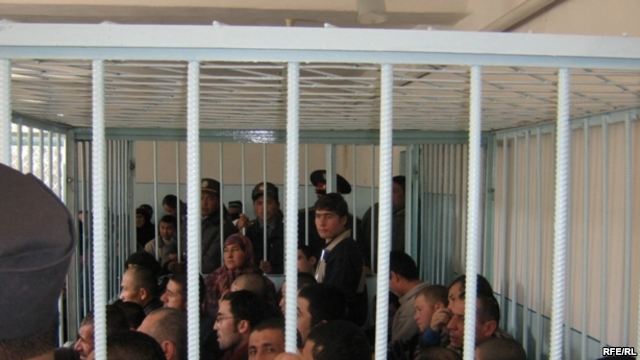
Hizb ut-Tahrir Rises on Kazakhstan’s Southern Border
Publication: Eurasia Daily Monitor Volume: 9 Issue: 134
By:

The Kyrgyz State Security Committee (GKNB) arrested two Kazakhstani men on June 28, who were “spreading and propagating radical and extremist ideas” with the assistance of staff at mosques in Bishkek in order to recruit women into their network. A subsequent search of their residence revealed literature calling for “Jihad and inter-religious hatred” and elements of an Improvised Explosive Device (IED). They will be prosecuted under Article 299 of the Kyrgyzstani Penal Code for “inciting ethnic, racial or religious hatred” (Interfax [Bishkek], June 28).
The following week, on July 4, a district court in Tashkent, Uzbekistan held the first hearing in the case of Kazakhstani citizen Yermek Kosmagambetov, who is accused of “smuggling materials of a religious nature” in his laptop as he crossed the border from Kazakhstan to Uzbekistan in March 2012. He will be tried under Article 246 of the Uzbekistani Criminal Code (Interfax [Astana], July 9).
The modus operandi of the two men in Bishkek and Kosmagambetov is consistent with Hizb ut-Tahrir (HuT), whose members are known for clandestinely disseminating pamphlets and digital media that promote HuT’s vision of a global Islamic caliphate, criticize the United States and Israel, and call for the overthrow of the secular governments in the Muslim World, among other themes. As in the Bishkek arrests, HuT focuses on recruiting women, who it believes are less likely than men to be suspected of illegal political activity and are “connecting links” within families capable of attracting relatives to join the organization (RFE/RL, July 11, 2007).
Kazakhstan banned HuT in 2005, and according to the Kazakhstani intelligence service, in 2007 HuT was “in disarray” as scores of its cells were broken up and hundreds of its members accepted a government offer to “surrender and be forgiven” (Novoye Pokoleniye, August 17). However, these recent arrests show that HuT influence remains even among ethnic Kazakhs like Kosmagambetov. Dozens of Kazakhstani students at Pakistani universities have also reportedly joined HuT and not returned home (Tengrinews, October 30, 2011).
There are signs of an increase in HuT activity in Almaty, unseen since police liquidated HuT’s printing house in Almaty in 2005 and arrested the organization’s Almaty branch head in 2006 (gazeta.kz [Almaty], February 8, 2005). In October 2011, the chief of Almaty’s Department for Domestic Policy expressed concern about “untraditional religious movements” after authorities found evidence of the HuT in the city (Central Asia Online [Almaty], August 17, 2011). If, as the UN Office for Drugs and Crime reported in March 2012, Kazakhstan intercepts less than 1 percent of the 75 tons of heroin estimated to pass through its southern borders each year, then HuT members with extremist material must also be able to exploit the border for their own purposes – like the men arrested in Kyrgyzstan and Uzbekistan.
HuT’s activity in Almaty may be related to the increase in HuT operations in Kyrgyzstan’s northern provinces bordering Kazakhstan. The head of the Kyrgyzstani Ministry of the Interior’s Main Directorate for Countering Extremism stated at an OSCE conference on extremist movements in October 2011 that the radical religious organizations operating in Kyrgyzstan have close links with extremist centers operating in Kazakhstan (Interfax [Bishkek], October 4, 2011).
HuT had been concentrated in the country’s southern provinces of Osh and Jalalabad where ethnic Uzbeks constitute the plurality (48 percent) and one-fourth of the population, respectively. Uzbeks tend to be more religiously conservative than traditionally nomadic ethnic Kyrgyz and Kazakhs. However, a series of recent arrests in northern Kyrgyzstan shows HuT is thriving in the border region:
• On April 4, four HuT members were arrested in Issyk Kul’s capital, Karakol, 30 kilometers from the Kazakh border, with extremist religious literature, leaflets, notebooks, audio cassettes, and DVDs (Interfax [Bishkek], April 4).
• On May 2, two HuT members from a four-person cell who were recruiting youths in Bishkek, Tokmok, Alamudun and Sokuluk districts of Chuy Province, which borders Kazakhstan, were arrested with extremist literature and digital media (24.kg [Bishkek] May 3).
• On June 22, police detained a 32-year old man at a bus stop in Ivanovka, Chuy Province, after finding him with 32 pieces of HuT literature (Central Asia Online [Ivanovka], June 22).
• On July 6, the GKNB arrested a resident of the Tyup district of Issyk Kul, which straddles the border with Kazakhstan, after a search of his residence revealed a large quantity HuT extremist literature and CDs (24.kg [Bishkek], July 6).
• On July 12, the Kyrgyzstani Interior Ministry Tenth Department detained members of HuT’s youth wing in Bishkek who were students at the country’s elite universities (24.kg [Bishkek], July 12).
HuT spread in northern Kyrgyzstan after clashes between ethnic Uzbeks and Kyrgyz in Osh in 2010 sent thousands of displaced people up north. The HuT coordinator for Bishkek said in 2010 that the HuT publishing center is in Bishkek and that HuT may have recruited as many as 50,000 new members within half of a year of the ethnic clashes (Central Asia Online [Bishkek], October 5, 2010). While his numbers may be an exaggeration, they are consistent with Kazakhstani expert Saule Mikhametrakhimova of the Institute of War and Peace Reporting (IWPR), who estimated in November 2010 that HuT’s membership in Kyrgyzstan ranged from 20,000 to 100,000 members.
Thus, the expansion of HuT activity in northern Kyrgyzstan and the networks that have formed across the two countries’ borders help explain why two Kazakh extremists were arrested on June 28 for coordinating their operations with staff at mosques in Bishkek. Despite these recent arrests of HuT members in Kyrgyzstan, the country’s experts argue that their government has not done enough to prevent Salafist imams who have studied in foreign countries from preaching HuT’s ideology when they return home (Interfax [Osh], July 2). The ramifications for Kazakhstan, whose regional economic hub of Almaty is only a five-hour drive from Bishkek, are clear and relate not just to Astana’s handling of domestic extremist groups, but also to the tackling of the country’s imperfectly secured borders (see EDM, July 6).




